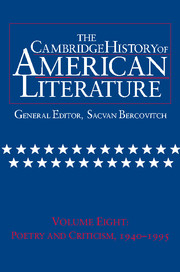Book contents
- Frontmatter
- Introduction
- Poetry, Politics, and Intellectuals
- Introduction
- 1 The Place of Poetry in the Culture, 1945–1950
- 2 Politics
- 3 Rear Guards
- 4 Avant-Gardes
- 5 Authenticity
- 6 Translation
- Conclusion: The Place of Poets, 1995
- Appendix I: Biographies of Poets
- Criticism since 1940
- Chronology 1940–1995
- Bibliography
- Index
6 - Translation
from Poetry, Politics, and Intellectuals
Published online by Cambridge University Press: 28 March 2008
- Frontmatter
- Introduction
- Poetry, Politics, and Intellectuals
- Introduction
- 1 The Place of Poetry in the Culture, 1945–1950
- 2 Politics
- 3 Rear Guards
- 4 Avant-Gardes
- 5 Authenticity
- 6 Translation
- Conclusion: The Place of Poets, 1995
- Appendix I: Biographies of Poets
- Criticism since 1940
- Chronology 1940–1995
- Bibliography
- Index
Summary
The most highly esteemed poet among American intellectuals is probably the Irishman Seamus Heaney; the most widely honored is surely the Lithuanian Czeslaw Milosz. I mean not only that American readers have a special attraction to foreign poets, but also that the recent history of American poetry can exclude neither the writing of foreign-born American residents nor the efforts of American-born poets to rewrite the poetry of other languages. In “The Day Lady Died” (1959), Frank O’Hara casually records picking up “an ugly NEW WORLD WRITING to see what the poets/in Ghana are doing these days.” American poetry since 1945 has been cosmopolitan in an obvious imperial sense: it has absorbed much more than American poetry ever has before. “The simile of an exhausted, Hellenic Europe surrendering its fate,” George Steiner remarked in 1964, “to an imperial, Augustan America gained a certain currency. There was, until circa 1959 a touch of Rome about American power, and a shade of Greece about the nervous, worn brilliance of European artistic and intellectual life.”
I am purposely making a wide circuit around the topic of translation, because my real subject is the interaction of American literary culture with other literatures, not just what is usually called translation. Our half-century has been especially greedy, especially curious about the world’s art, as well as its other resources. Clearly, we have a poetry of global ambitions partly because our economy is global and our political interests extensive. It is much too simple, though, to say only that one causes the other.
- Type
- Chapter
- Information
- The Cambridge History of American Literature , pp. 160 - 193Publisher: Cambridge University PressPrint publication year: 1996

